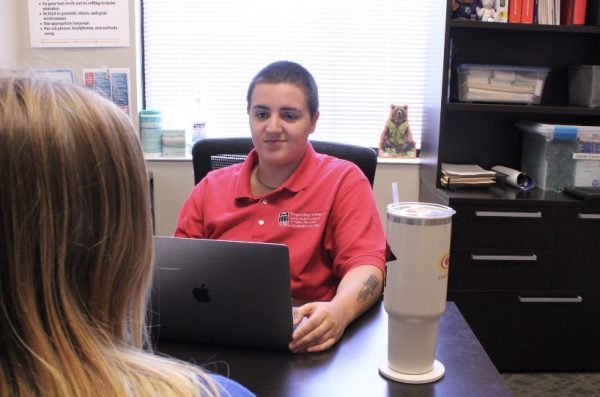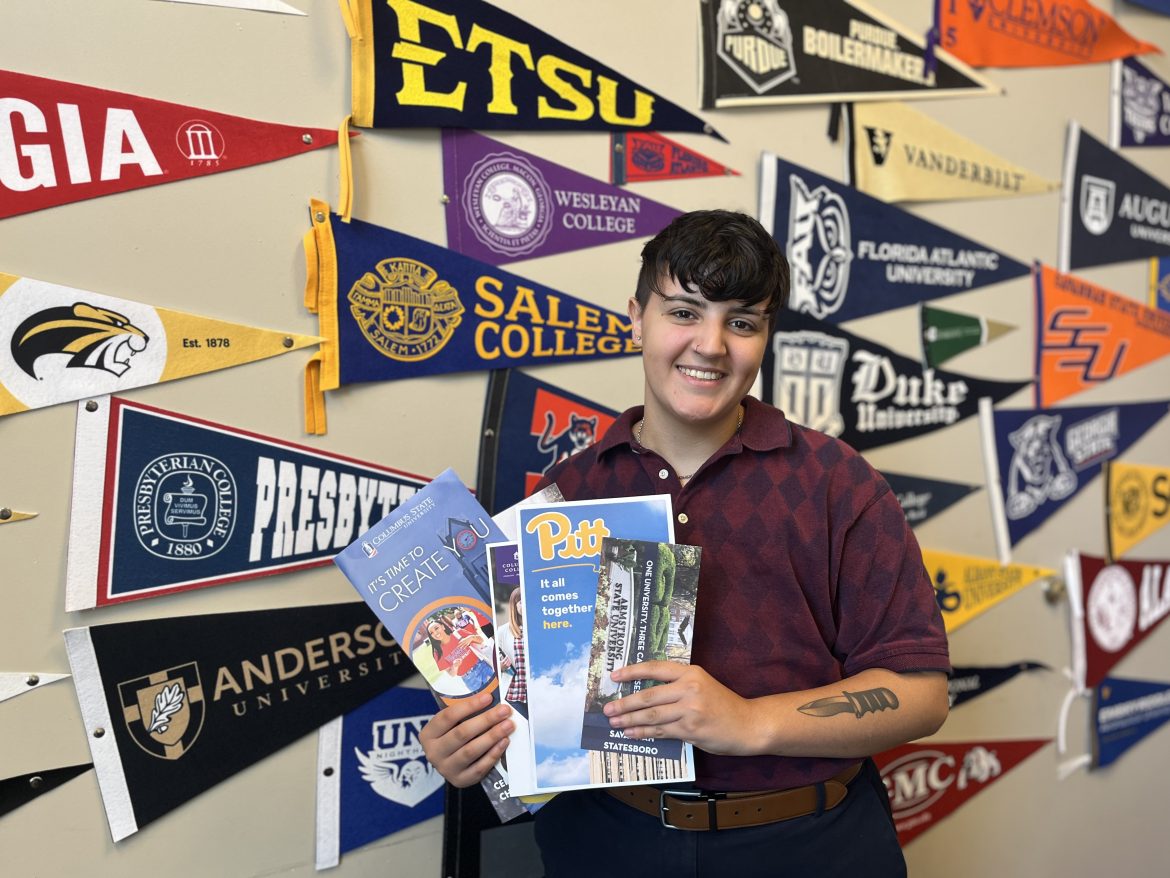Clarke Central High School College and Career Adviser Alejo Zayas poses with a variety of college pamphlets in Room 525 on Aug. 19. Before coming to CCHS for the 2024-25 school year, Zayas worked as a volunteer Spanish tutor at Classic City High School. “Having volunteered first in the school system was really helpful for me. Classic City is very different from Clarke Central, but I didn’t go to public school when I was a kid, so that was a good way to break me in,” Zayas said. “I’ve worked with kids literally my entire life, so it’s nothing new, in that sense.” Photo by Liya Taylor
Clarke Central High School’s new College and Career Adviser Alejo Zayas talks about his new job and their goals for the 2024-25 school year.
Social Media Coordinator Liya Taylor: What does a college and career adviser do?
Clarke Central High School College and Career Adviser Alejo Zayas: I do a lot of one-on-one meetings with students, primarily seniors in the fall. (We) just try to figure out with them what their post-secondary plan looks like, regardless if that’s college, a career, the military, that kind of thing. Just (figuring) out what they want to do and (making) a plan to get there. (In) the spring, I still work with seniors, but by then most of them have applied so it’s just a matter of planning Decision Day and then maybe starting to have some junior meetings.
LT: What does a meeting with you look like?
AZ:Typically the one-on-ones are about 30 minutes long, and I meet with every single senior, so it’s a pretty big caseload, but I get through all of them this fall. If I’m meeting them for the first time, I ask them to tell me about what they do, what they like to do outside of school (and) what they’re thinking about doing when they grow up. Then with the parents, it’s usually more about financial aid. How are (they) going to afford college (and) if that’s what they want to do, what are their options?
LT: What skills do you bring to the table for this job?

College and Career Adviser Alejo Zayas helps a student in Room 525 on Sept. 9. Zayas attended the University of Georgia and through his time there, they found a love for Athens. “I grew up in Suwannee, (Georgia) over in Gwinnett County but I really like the small-town feel of (Athens,)” Zayas said. “I ended up touring (CCHS) before I accepted the job and the community here seemed really tight-knit. I (toured) the school with (former CCHS College and Career Adviser) Mr. (Gabriel) Smallwood, and he knew like every single person he passed by and I was like, ‘Okay, I feel like this is a good place.’” Photo by Liya Taylor
AZ: I offer (meetings) in English and Spanish. We have such a large Spanish-speaking population among our students, and (for) parents who might have immigrated here (and) might not know a lot of English, or what resources are available for them, (it) is really important that I can communicate with them. I know in the past there have been meetings where the student’s a translator and that’s really unfortunate to have to put that on them. I’m excited that they’ll be able to just relax and be able to figure out what they need to do.
LT: What are your goals for this year?
AZ: I’m really hoping to reach as many people as I possibly can, and get everyone with at least a plan of what they want to do. We have numbers that we (have) to reach, but ultimately, with every student, I want them to feel comfortable where they’re at. It’s important to remember that they’re not just data points and that this is actually their life. I want to reach as many people as I possibly can and hopefully give them more resources than they knew were out there.
LT: With CCSD’s trend of low graduation rates, how do you plan to change this pattern and increase the graduation rates?
AZ:I think that’s partly just relying on the counseling team. We’ve had a lot of meetings talking about that and what we can do, and just encouraging students to really focus on graduating from here and taking the next step. A lot of students come to me and they’re like, ‘I hate being in school, I don’t even want to graduate from here, why should I go to college.’ Well, if you hate school, maybe you don’t have to go to college, we’ll find something else. So, just really focusing on the aspect of once you graduate high school, you’re really free to do anything.
LT: Why do you think it’s important for students to have conversations with their college and career advisers?
AZ: A lot of students are very independent and feel like maybe they don’t need help. I’m amazed honestly, at the independence and how much they’ve managed to figure out without me. But, there are always more things that you just haven’t heard of yet or don’t know about that I could help with. So regardless of what students want to do, whether that’s a four-year school, two-year school, military, career, or anything, it’s just good to talk with me. So, A., I know you have a plan, and B., I can help you kind of further break that down and figure out how to get there.
“I’m really hoping to reach as many people as I possibly can, and get everyone with at least a plan of what they want to do. ”
— Alejo Zayas,
College and Career Adviser
LT: What type of students should reach out to you?
AZ: I think especially students who really don’t know what they want to do at all. Meeting with me would be a good jumping-off point to explore some options, talk about what they like to do, (and) maybe if they can turn that into a career or something they might want to study. So, seniors who don’t know what they want to do, and also seniors who don’t know what their college options are. A lot of them might be worried that their GPA is too low to go to college, which is pretty much untrue. Even if you have a really low GPA, there are programs to help you improve on that. Then (also) affording college is, of course, going to be the biggest (problem) for pretty much everyone, but that’s what I’m here for.
LT: How does a student reach out to you?
AZ: I presented to the senior advisement and told all of them that they need to make appointments with me. The easiest way is if they just go ahead and schedule an appointment, but since I have to meet with all of them, whoever doesn’t schedule an appointment, I’m gonna at some point email them, and if they still don’t schedule, I gotta pull them out of class. If they’re not a senior, especially if they’re trying to figure out test registration, I just encourage them to email me or just drop by my office if I’m available. In the spring, when I have a bit more time for more meetings, we can actually start talking about what they want to do. To make an appointment, I have a Calendly link.
